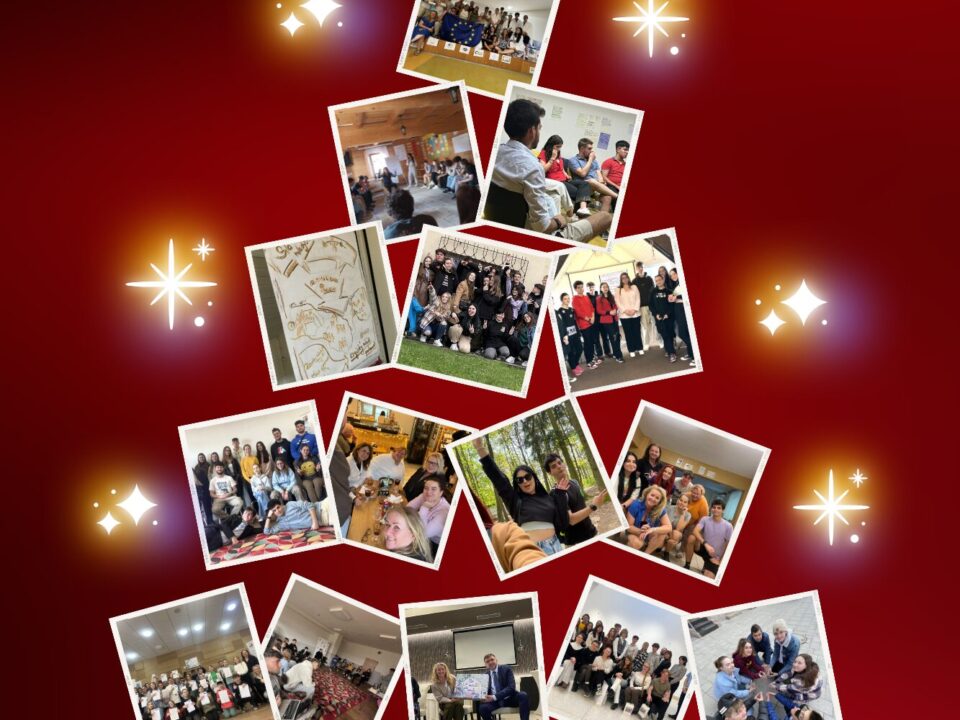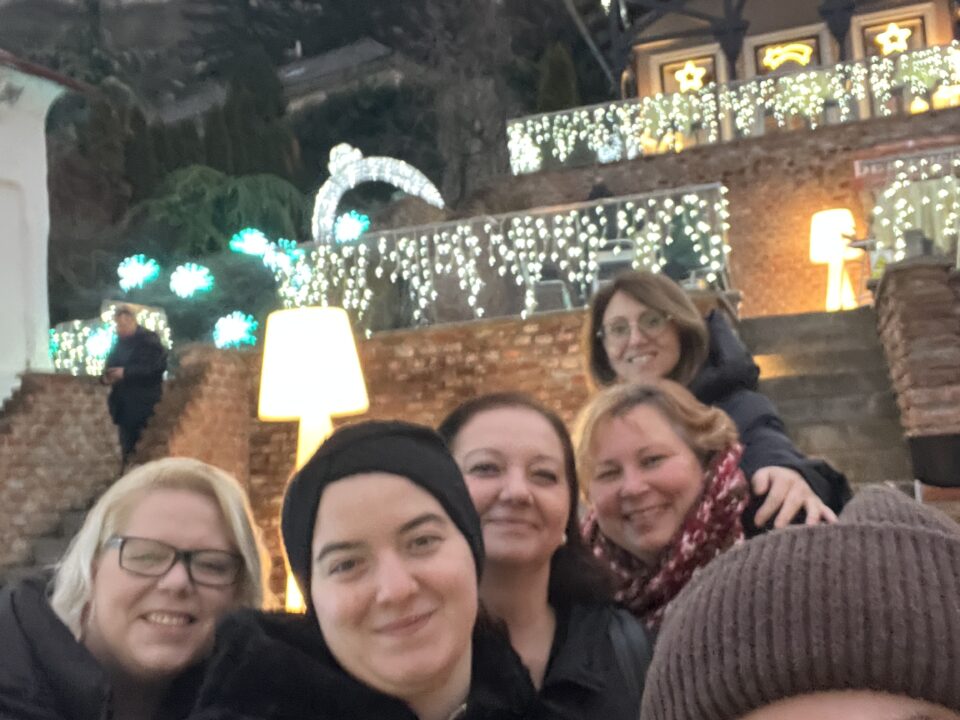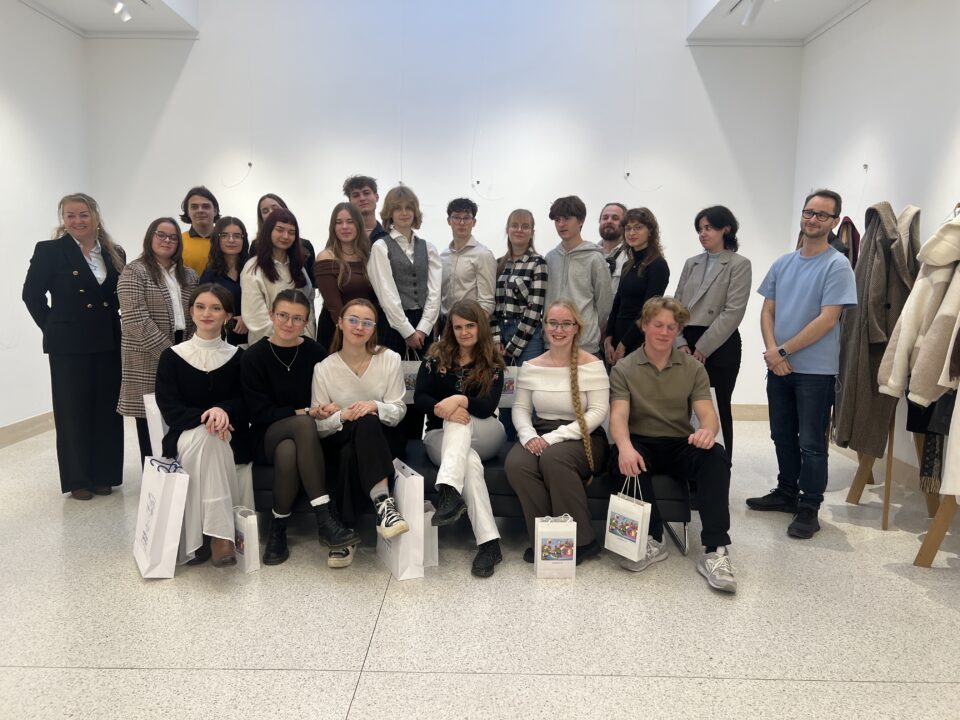LIQ – Lets improve the quality 4.-11.7.2022 Slovensko, 9.-16.8.2022 Portugalsko – Medzinárodný projekt krátkodobej mobility pracovníkov s mládežou

Stretnutie koordinátorov školských parlamentov 24.6.2022
16. júna 2022
Stretnutie stredoškolského parlamentu Trenčianskeho samosprávneho kraja 12.09.2022
11. augusta 2022V dňoch 4-11. júla 2022 prebiehal medzinárodný projekt LIQ, ktorého hlavným cieľom bolo zvýšiť kvalitu práce s mládežou prostredníctvom výmeny skúseností a informácií pracovníkov s mládežou z Portugalska a zo Slovenska. Účastníci projektu počas pobytu navštívili Trenčiansky samosprávny kraj, Krajské centrum voľného času v Trenčíne ale aj mestá Trenčín, Trenčianske Teplice, Prievidza, Bojnice, Púchov či Vysoké Tatry.

Návšteva TSK 
Trenčiansky hrad 
Vysoké Tatry
Druhou aktivitou projektu bola návšteva portugalských organizácií a samospráv, kde sme pokračovali v nadväzovaní spolupráce. Počas aktivity sme mali možnosť sa zúčastniť aj podpornej aktivity národnej agentúry Erasmus + z Lisbonu, kde diskutovali o možnosťiach programu pre mladých ľudí, pracovníkov s mládežou, samosprávy, ale hlavne aj pre tých, ktorí iné možnosti nemajú.
https://www.facebook.com/photo.php?fbid=376151191343060&set=a.258622269762620&type=3

A ako to vyzeralo na mieste?
Nové partnerstvá:
Federation of Youth Associations (FAJUDIS)
The Federation of Youth Associations (FAJUDIS) of the District of Santarém is based in
Constância. It is a non-profit organisation whose mission is to support and boost youth
associations in the district of Santarém. Its aim is to value and stimulate youth associations,
highlighting their potential in local development and youth training. FAJUDIS promotes actions that mobilise young people and associations to be experts in business development in their communities and associations. FAJUDIS does this by offering various support services, activities and training actions, to associations and/or young people. They also have a Resource Centre which is available to all their members and the local community.
They are driven to have a constant knowledge of the reality of youth associations in the
district, as well as meeting the needs and aspirations of young people, in order to mobilise and raise awareness among the various entities working with and for young people. FAJUDIS also actively participates in national and international projects in various areas such as; gender equality, solidarity, volunteering, international cooperation, civic participation, active
citizenship, democracy, entrepreneurship…and others.
Portuguese Institute for Sport and Youth (IPDJ)
The mission of the Portuguese Institute for Sport and Youth (IPDJ) is to implement an
integrated and decentralised policy in the areas of sport and youth in close cooperation with
public and private bodies, namely sports organisations, youth and student associations and
local authorities.
The IPDJ intervenes in the definition, implementation and evaluation of the public policy of
sport, promoting the generalisation of sport, as well as the support to regular and high
performance sport, through the provision of technical, human and financial means. The
preservation of ethics in sport is also one of IPDJ’s essential scopes.
In the same way, the IPDJ aims to stimulate support for associations, voluntary work and the
promotion of citizenship, the occupation of free time, non-formal education, information and
the geographic mobility of young people in Portugal and abroad. It also proposes to revitalise
youth tourism, particularly with regard to the Youth Hostels network and the Youth Card, in
order to increase mobility, with gains in efficiency and economy.
Municipality of Torres Novas
The municipality of Torres Novas aggregates ten parishes located in Região Centro
(NUTS II) and Médio Tejo sub-region (NUTS III). The municipality is inhabited by 34114
Torres Novas inhabitants in a total area of 270,0 km2 characterized by the coexistence
of the limestone formation of the Serra de Aire and the Almonda river, which widens
into „lezírias“ (marshes) at the confluence with the Tejo river.
At a municipal level, it borders Tomar (north and northeast), Ourém (north and
northwest), Entroncamento and Vila Nova da Barquinha (east), Golegã and Santarém
(south) and Alcanena (west).
History
The region has been appealing since ancient times, and man has left traces of his
presence since the Palaeolithic in places situated on the edge of the karstic network of
the Almonda River, such as the caves of Buraca da Moura and Oliveira or the Lapa da
Bugalheira.
Later, at the beginning of the Roman Empire, Cardílio and Avita became the owners of
one of the several „villae“ existing in the area, the Vila Cardílio, which would be
classified as a National Monument in 1967. This Lusitanian-Roman villa was inhabited
in the 1st to 4th centuries AD and among its ruins there are colourful mosaic panels,
coins, sculptures, as well as the Latin inscription which, in an interpretation, wishes the
couple well in their „villa da torre“, an expression associated to a plausible origin of the
toponym Torres Novas.
From the 12th century onwards, the territory then known as Turris began to take on its
present shape, with the expulsion of the Arab invaders by the troops of D. Afonso
Henriques (1148) and the foundation of the county in the charter attributed on 1st
October 1190 by D. Sancho I. The castle, which in the meantime had fallen into ruins,
was rebuilt by order of this sovereign and later by order of King Fernando I following
the wars with the kings of Castile. The fortification stood the test of time and would
only undergo a new rebuilding programme six centuries later, by which time it had
already been classified as a National Monument, in 1910.
During the Middle Ages, the surrounding area experienced strong demographic and
economic growth, receiving the Fair Charter in 1263 and becoming part of the
dominions of Queen Santa Isabel of Aragon in 1304, by donation of her husband, King
Dinis. In the following centuries, it would become a meeting place for the courts and
historical moments, such as the oath of marriage between the infants Beatriz and
Henry, children of Ferdinand I and John I of Castile (1380), the establishment of the
regency of Leonor of Aragon, due to the donation of her husband, King Dinis. Leonor of
Aragon, due to the death of her husband D. Duarte I and the minority of her son D.
Afonso V (1438) and the decision to hold the Cortes at intervals of a decade in order to
create proximity between the kings and their subjects (1525).
The town had Isabel de Avis as donatary in the first half of the 15th century and
received a new charter during the reign of Manuel I (1510). In the following decade, D.
João de Lencastre would hold the title of first Marquis of Torres Novas, together with
that of Duke of Aveiro, both extinct in 1759 by sentence due to the supposed
implication of D. José Mascarenhas da Silva e Lencastre in the attempted regicide of
King D. José I. The monarch survived and it was his daughter, Queen Maria I, who
granted Henrique Meuron and David Suabe permission to build the Fábrica das Chitas
(1783), which was destroyed by General Massena’s troops during the third French
invasion (1810).
The economic fabric developed throughout the 19th century and among the most
successful cases are the foundation of the Fábrica de Papel do Almonda (1818), the
constitution of the Companhia de Fiação de Torres Novas (1845), as well as the
creation of the transport company João Clara & Companhia (Irmãos) Lda. which, at the
date of its nationalization (1975) was called Clara Transportes – S.A.R.L. and
accumulated the largest market share in the country with the second largest in the
Iberian Peninsula.
The inauguration of the railway line from Torres Novas to Alcanena in 1893, on the
other hand, was one of the most curious and troubled episodes in the business history
of the region. The „Little Train“, so called because of its small size, was operated by
Companhia de Caminhos de Ferro de Torres Novas a Alcanena – S.A.R.L. (owned by the
Baron of Matosinhos) and circulated, most of the time, on a narrow gauge track based
on roads. The multiple derailments earned it a second name, „Rata Cega“, and
contributed to the closure of the line three years after its creation. The 20th century
arrived and the memory of the railway tracks was diluted in the growing regional
affirmation of the county which determined the elevation of Torres Novas to city in
1985.
The municipality of Torres Novas has a large number of associations, many of which
are youth associations. Throughout the last years, it has been an active agent in the
work with young people, having the Municipal Youth Council and dynamising several
projects in the scope of the ERASMUS+ Programme, alone or in partnership with other
associations/entities.
It also participates in other projects, such as EUHRENET, one of the first projects
coordinated by Portugal in the new programme of the European Commission and
developed over 16 months, including seven meetings, four online and three face-to-
face, two organised and hosted by Torres Novas. In addition to the Portuguese
representation, the network includes partners from Italy, Romania, Austria, Poland,
Hungary, Croatia, Spain, Slovenia, the Netherlands, Malta and Czech Republic.
The EUHRENET (European Human Rights Network of Towns) network will be
coordinated by Torres Novas, joining other 11 municipalities or entities participating
on behalf of municipalities, with the aim of sharing strategies, among citizens and civil
society of the respective partners, for a better implementation of local policies in
reference to the Charter of Fundamental Rights of the European Union.
In this context, a municipal application to the European programme CERV (Citizens,
Equality, Rights and Values) was approved, within the scope of the Networks of Cities,
with approved funding of 171,210 euros.
Clube de Karaté Amicale de Alcanena
The Clube de Karaté Amicale de Alcanena, association founded on 21 October
2005, has as main objective the promotion and defense of the practice of
martial arts, and related activities, such as the practice of physical education,
organization of sports meetings and development of joint actions with other
entities.
The Clube de Karaté Amicale de Alcanena, has implemented throughout its
existence, a project of training and competition for all its practitioners, having
obtained excellent classifications in the competitions where it competes.
On March 9, 2013, Alcanena City Council established the Collaboration
Protocol with the Clube de Karaté Amicale de Alcanena, for the provision of the
property located in Filhós, Registered in the urban property matrix under article
443, parish of Bugalhos, where the 1st CEB School of that locality used to
operate, owned by the Municipality of Alcanena.
The Karaté Amicale Club of Alcanena, since that date, has made considerable
improvements in the property, adapting it to the practice of sport, creating
conditions for the hosting of members for other initiatives that may be organized
in pursuit of its objectives.
Karate Amicale has been participating and obtaining classifications in various
regional, national and international competitions, and is also responsible for
stimulating the locality where the association is located, attracting various young
people with whom it has been working in the practice of this sport.

Santa Margarida Environmental Park and Tropical Butterfly Greenhouse
In an area of six hectares and in a setting of great quality and beauty, the Santa Margarida
Environmental Park offers visitors direct contact with nature, enjoying moments of tranquillity
and providing information and activities related to the environment.
The Park includes an ecoteca, a garden of aromatic and medicinal plants, an open-air
amphitheatre, water mirrors, a children’s playground, a games field, a picnic park, an
observation tower from where you have a general panoramic view of the Park and can
appreciate an immense landscape, and a butterfly garden.
The tropical butterfly house is a space where the conditions of a hot and humid tropical
environment are recreated. Various species of butterflies fly here, allowing visitors direct
contact with these magnificent insects.
Constância Municipality, where the Environmental Park is located, promotes a set of
environmental awareness activities among the juvenile community, having several
occupational programmes where it also involves volunteers in the development of its
activities. The importance of raising the awareness of young people and their families to issues
such as environmental protection and sustainability are some of the main objectives that led
to the creation of this project, unique in the region.
Serra de Santo António Welfare Centre
The Serra de Santo António Welfare Centre is a non-profit Social Institution whose statutes
were approved and published in the III Series of the Diário da República nº 276, of 28
November 2003.
The construction project of the installations was adjudicated for the amount of 1.812.528,39€,
having counted with the effort of a group of volunteers, to endow this laborious parish of Serra
da Santo António with a Centre of Social Welfare with several valences, namely the support to
the 3rd age, which is at the moment one of the most felt needs.
The idea was born after the availability demonstrated by the couple formed by Mr. João
Coelho Achega, natural of Minde, and his wife Mrs. Maria da Conceição Silvestre – the teacher
„Maria Silvestre“ – natural of Serra de Santo António, of donating a land with 5220 m2 that
they possess in this Freguesia, to install a Social Service to support the population.
It was necessary to unite efforts and availabilities to advance with the idea.
It was celebrated the Contract of Financial Sharing, relative to the project that aims at the
development of the social answers as, Day Center, Home of Aged and Service of Support to the
Domicile.
With the following capacities:
25 users
50 users
25 users
The present contract is governed by the regulations of the Social Equipment Network
Extension Programme – PARES, through the granting of public funding of 519,234.90 euros
(five hundred and nineteen thousand, two hundred and thirty-four euros and ninety cents).
The Centre has been operating since January this year, with the participation of many
volunteers, including young people, who actively participate in the animation and socialising
activities with the elderly attending this centre, thus enabling a set of intergenerational actions
that ensure, on the one hand, the well-being of the elderly and, on the other, the development
os skills in young people participating in these volunteer programmes.
SCOCS – Sport Club Operário de Cem Soldos
Founded in 1981, the Sport Club Operário de Cem Soldos (SCOCS) is the local cultural
association whose mission is to promote the social, cultural, sports and recreational well-being
of the population, favouring the mutual development of the Association and the Community in
these areas.
Since then, the SCOCS has ensured the creation of an exceptional social dynamic, being
responsible for the community involvement, training and entrepreneurship of many young
people from Cem Soldos, whose most mediatic result is the Bons Sons Festival, which has
become known nationally.
BONS SONS Festival is an important platform for the dissemination of Portuguese music, of
scale and national reference. It is the great Portuguese music festival that takes place in August
and is the most emblematic event in the village of Cem Soldos, organized by the cultural
association Sport Club Operário de Cem Soldos. It had its first edition in 2006 and throughout
the several years of consolidation of the project, it maintained its central characteristics: the
valorization of Portuguese music in its various expressions and the involvement of the
community of Cem-Soldense.
The careful selection of the program – which includes emerging and established projects – the
unique venue that is Cem Soldos and the involvement of the population in the realization are
hallmarks that distinguish BONS SONS from the national cultural offer.
During the four days of the festival, Aldeia de Cem Soldos is closed and its perimeter delimits
the enclosure that hosts 8 stages, each dedicated to a programmatic line, perfectly integrated
into its streets, squares, church and other equipment. In addition to this characteristic, BONS
SONS promotes a close relationship with its audience, involving the population in its
realization. It is the inhabitants who welcome and serve the visitors, in a special sharing
between those who receive and those who visit, providing the unique experience of a musical
event.
In addition to the musical programme, the festival offers a series of parallel initiatives, such as
the leather goods fair dedicated to new handicrafts, exhibitions of visual and plastic arts,
conversations in the squares, short film sessions in the Auditorium, games for families,
storytellers, donkey rides, art tours, or Baby Music sessions.
BONS SONS promotes local development, by training audiences for culture, raising funds for
the development of projects aimed at the community of Cem Soldos, professional and
community training in the community, or attracting people to the municipality of Tomar. that
boost the economy of the locality, the county and the region.
Some indicators express the value and maturity of this project. The festival has more than
35,000 visitors, 400 volunteers, and around 50 concerts per edition, with media and socio-
economic impact amounting to 3.5 million euros for the region (estimate for the 2019 edition).
More than scale, the project has grown in quality, resource management, partnerships, and
programmatic diversity.
Within the scope of the Portugal and Iberian Festival Awards, BONS SONS was distinguished
with the following awards: More Sustainable Festival (2014); Best Medium Size Festival (2015
and 2018); Contribution to Sustainability (2015); Best Alignment (2016); Best Reception (2016,
2017 and 2018); and Best Camping (2017).







